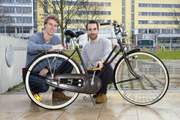Practical courses
Practical courses in the bachelor's programs
System Design Project with robotics competition
Participants: All bachelor students
At the beginning of their studies, students take part in the System Design Project in the first semester. In this lab, they learn the basics of a system design on a macroscopic system, as well as the realization and subsequent optimization based on this. They use all the essential components that can also be found in a microsystem: Sensors, actuators, mechanics, information processing and control. The desired functionality is achieved through the interdisciplinary interaction of the individual components.
This course leads to a robotics competition, which takes place every year. The students compete in interdisciplinary groups of 4 in the categories "fastest robot", "best designed robot" and "most innovative robot".
The students get the Lego robot construction kit LEGO MINDSTORMS and work in interdisciplinary teams to build a vehicle that autonomously drives along a course not previously known to the participants. The vehicle must fulfil various tasks.
The competition is held at the Laboratory for Electrical Instrumentation and Embedded Systems (Prof. Stefan Rupitsch) and the Chair for Power Electronics (Prof. Oliver Ambacher). Contact persons are Alexander Richter and Till Steinmann.
Impressions System Design Project robot competition 2023
|
|
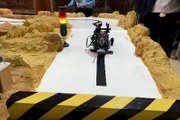 |
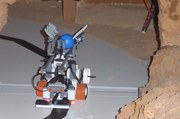 |
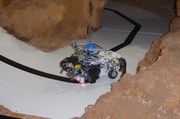 |
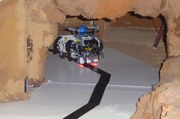 |
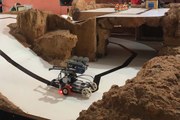 |
Winner Innovation
group name: „Y Space?“
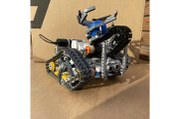
Fastest Robot
group name: „404 group not found“
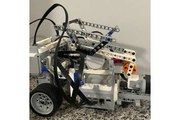
Winner Design
group name: „Lorem Ipsum“
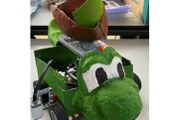
Learn more about the robot competition 2023.
Clean room lab course
Participants: All bachelor students
In order to provide students with valuable practical knowledge as early as possible, they already participate in the clean room lab course in their first bachelor year. This course is conducted in small groups of only four participants.
During the course, students learn the safety requirements and rules of conduct in a clean room and can carry out the most important processes of semiconductor technology themselves. The common techniques of practical and scientific work (experimental planning, execution, evaluation, interpretation and reporting) are also learned and applied.
360-degree view of the Clean Room Service Center (RSC)
About the Clean Room Service Center (RSC):
In addition to the laboratories of the individual chairs, the Department of Microsystems Engineering IMTEK has its own clean room, which is coordinated by the RSC.
The approximately 600 square meter clean room of class ISO 4 - 6 forms the process technological backbone of the institute and enables the execution of all standard silicon semiconductor processes and numerous compatible technology steps. The clean room area is divided into individual white rooms and intermediate grey rooms with variable wall elements, thus enabling flexible working. The research focus in the IMTEK clean room is on developing functional models of microsystems with applications ranging from sensors and microactuators to micro-optics.
Electronics
Participants: Bachelor students of Mikrosystemtechnik and Embedded Systems Engineering in the 3rd semester
Electronics at your fingertips!
The electronics lab is carried out by a team from the Laboratory for Micro-optics, led by Prof. Zappe.
Using the principles and theories they have learned in the lecture, lab students can now wire up and measure real circuits, and see how electronics works in practice.
Students are provided with two high-tech electronics kits equipped with all the components and instrumentation they need. Working in pairs, they will construct amplifiers with bipolar and MOSFET transistors; drivers for light-emitting diodes using operational amplifiers; and digital logic gates.
Students will learn how to handle power supplies, function generators and oscilloscopes; how to carry out detailed electronic measurements; and finally how to professionally present and interpret the measurement data.
By the end of the lab, electronics will no longer be a mystery but instead an important tool which all microsystems engineering students need to use.
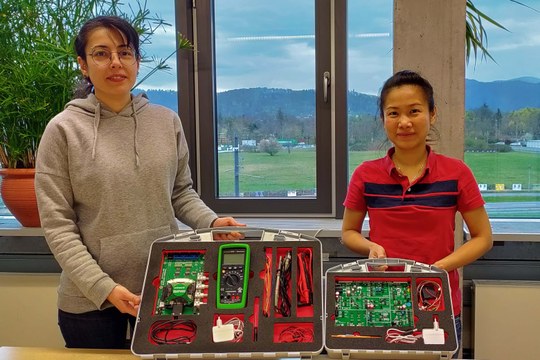
Electrical Instrumentation
Participants: Bachelor students of Mikrosystemtechnik, Embedded Systems Engineering, and Sustainable Systems Engineering in the 4th semester.
The electrical instrumentation lab course is carried out at the Laboratory for Electrical Instrumentation and Embedded Systems (Prof. Stefan Rupitsch). It consists of several experiments that are adapted to applications in microsystem engineering. The experiments teach basic knowledge in electrical instrumentation and evaluation of physical and mechanical quantities. For this purpose, elementary electronic measuring circuits are analyzed with simulations (LTSpice), set up, and applied in the course. In addition, students deepen their knowledge of typical electrical instrumentation measurement techniques such as oscilloscopes, digital multimeters, and frequency generators.
The components required for the course are included in the kit for measurement technology.
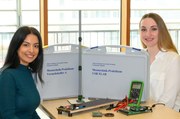 |
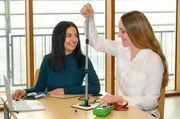 |
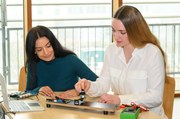 |
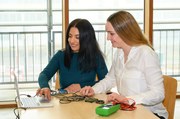 |
Embedded Sensor Technology for Environmental Monitoring (ESUM)
Participants: Bachelor students of Mikrosystemtechnik, Embedded Systems Engineering, Sustainable Systems Engineering
The ESUM course is conducted at the Laboratory for Electrical Instrumentation and Embedded Systems (Prof. Stefan Rupitsch). Contact person is Dr. Jochen Kieninger.
Sensors are used in almost all technical systems today and usually only gain importance through their use in embedded systems. Therefore, knowledge of the entire chain is required, from the physics of the measurement principle to the technical realization of the sensor to the correct measurement technology and data processing. In this course, the focus is on sensor parameters from the field of environmental sensors.
Module 1: Acceleration Sensors – Earthquake Detection
Airbags, robotics, and human-machine interfaces (HMI) in mobile phones or game consoles are typical fields of application for acceleration sensors. Much less attention is paid to their use for detecting and evaluating seismic activity. In addition to observing natural and anthropogenic earth movements, special integrated sensors are mainly used for safety-critical systems for emergency shutdown. With the sensor used in the course, the students can observe seismic activity and the movement of buildings by traffic (trucks, trains). You can choose a specific task and, for example, investigate whether you can detect earthquakes at the perception threshold, work out a distinction between an ICE and a cargo train, describe the time-of-day-dependent movement of their house on a thoroughfare, or analyze the swaying of the observation deck of a tower.
Module 2: Optical Sensor Technology – Particulate Matter
This module includes knowledge about sensor technology and how to collect the data yourself (e.g., also as a Citizen Science activity). The sensor used in this module is an optical particulate matter sensor that can determine particle concentration and size distribution based on light scattering. On the software side, the focus is on connecting the microcontroller to the cloud via a wireless internet connection – a classic Internet of Things (IoT) application.
Module 3: Radioactive Radiation
While nuclear power plants and the concern about the unintentional release of radioactivity in case of accidents and the problem of radioactive waste are often in the foreground, another source of danger does not play such a major role in public perception: radon. This gaseous alpha emitter can penetrate houses in some areas of the Black Forest and its surroundings due to the decay of naturally occurring uranium from the soil. Therefore, this module's main focus is measuring radon with a scintillator counter in basement rooms. On the software side, the focus is on data storage on an SD card to record measurements over a longer period (data logger).
The components required for the internship are provided in the ESUM lab course kit.

Embedded Systems Engineering
Participants: Students of Embedded Systems Engineering in the 4th-6th semesters.
The course Embedded Systems Engineering is offered by the Chair of Operating Systems (Prof. Christoph Scholl). In this lab course, the knowledge acquired in the field of modelling of embedded systems will be applied and deepened in practice. The software package Matlab/Simulink, which is widely used in industry, will be used for this purpose.
In the first part of the lab, the usage of the software package Matlab/Simulink as well as its extension Stateflow will be learned based on step-by-step instructions and further practiced by means of smaller tasks.
In the second part of the lab course, the acquired knowledge is deepened by designing an ignition control for a four-stroke spark-ignition engine. The control system has to calculate continuously the position of the pistons from the position signals of the crankshaft and trigger ignitions at the right times. The environment is a physical model of the engine that reacts to the ignition signals of the control system. The correct timing of the ignition has a direct influence on the engine's performance. Afterwards, the engine control is extended by an automatic rotation speed control. All in all, this results in a complex interaction of digital control and physical model.
Finally, in the third part of the lab, the modelling aspect is extended by code generation for an Atmel microcontroller. The task consists of designing an automatic gear shift for a road bike followed by synthesizing the system. The C code automatically generated in this process is transferred to a development board (Arduino Uno). The development board is mounted on a road bike and connected to an electronic gear shift. The goal here is no longer pure simulation, but a fully functional hardware whose behaviour has only been modelled by statecharts.
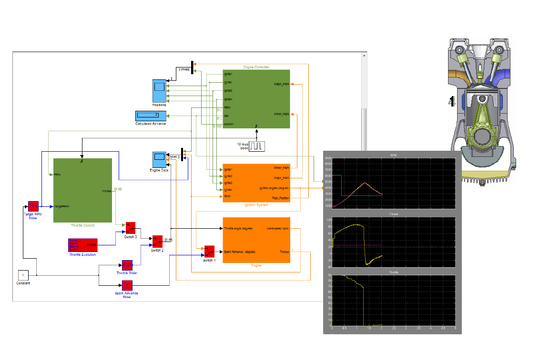
Ignition control for a four-stroke spark-ignition engine

Hardware structure
Software Praktikum (SoPra)
Participants: Students of Computer Science and Embedded Systems Engineering in the 3rd semester
The Software Praktikum is held at the Chair of Software Engineering (Prof. Andreas Podelski). Students will learn to follow a software development process, starting from requirements elicitation through design to implementation, and they will learn how to deal with complex systems and how to organize work within a group.
The students are divided into groups. They will have specific tasks to complete. They will have to organize themselves, define the requirements, divide the work skillfully among the group members and learn new technologies independently.
Different games have been developed over the last iterations of the software lab:
1. Train monsters called Tavis to overcome the evil sorcerer:

2. Build a base and instruct robots to defend against masses of alien creatures:

3. Place your units to defed the castle against robbery:

4. Use the abilities of your three heros to sneak by infected computers and disable their AI-mastermind:

5. Assemble a party of fantasy heroes and clear out dugeons an defeat a devil:

Practical courses in the master's program
Sensors Lab Course
This course is aimed at master's students of Mikrosystemtechnik, Microsystems Engineering, and Embedded Systems Engineering.
The Sensors Lab Course is conducted at the Laboratory for Electrical Instrumentation and Embedded Systems (Prof. Stefan Rupitsch). Contact person is Dr. Jochen Kieninger.
In the three modules of the course, students deepen their knowledge from the lectures on sensor applications through practical experience.
Students can determine acceleration and rotation rate on a carousel, the pressure difference during a lift ride, the intensity of the earth's magnetic field in Freiburg, and indoor air quality. All experiments use the Arduino Nicla Sense ME platform, which includes four state-of-the-art integrated sensors from Bosch Sensortec, an Arm Cortex M4 processor, and Bluetooth connectivity. The various sensors are an inertial measurement unit (IMU) that measures acceleration and rotation rate, a pressure sensor, a magnetometer, and a gas sensor that provides parameters such as the equivalent concentration of CO2 and volatile organic compounds (VOCs) along with temperature and humidity.
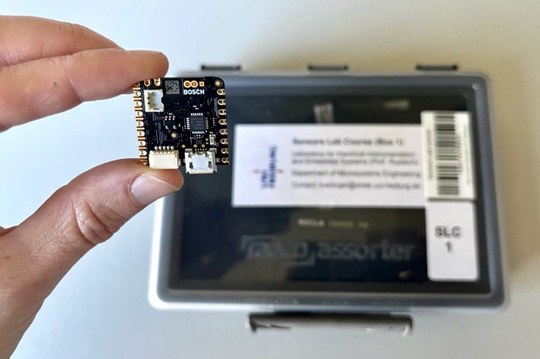
COSIMA – the competition for students
COSIMA is a nationwide student competition in the field of microsystems engineering and stands for "Competition of Students in Microsystems Applications". The competition challenges master's students of microsystems engineering to find new applications for sensors and microsystems. In particular, they are looking for applications that improve and facilitate the interaction between humans and technology in various areas of daily life.
The special feature: There is no specific task. What is required is a pioneering spirit, creativity, a wealth of ideas and the ability to plan and implement a project in a well thought-out manner and to present the result to an audience. The teams acquire their own budget.
The top three teams overall receive a cash prize and are automatically qualified to participate in the international competition iCAN - a Chinese initiative that brings together the three winning teams of the regional competitions from China, Japan, Taiwan, Singapore, USA and Europe.
COSIMA is organized by the Association for Electrical, Electronic & Information Technologies (VDE) with the support of the Federal Ministry of Education and Research.
Competition successes of the University of Freiburg
SmartFaraday: 1st place
In 2017, Konstantin Hoffmann, David Stork, Dominik Leclerc and Ann-Kathrin Leiting took first place with their project "SmartFaraday".
SmartFaraday is a bicycle pedal equipped with sensors that provides data on cadence, power, climate friendliness, jump duration, position, distance or altitude profile and also warns of theft and emergencies.
 |
|
CABLE-bot: 3rd place
In 2015, Karl Lappe, Konstantin Hoffmann and Wesley Custódio were awarded third place for their project "CABLE-bot".
CABLEbot is the prototype of a robot designed to pull suitable cables into empty conduits during the electrification of buildings. While live cables, antenna, network and telephone cables are usually pulled in either by pressure difference or mechanically with the help of a pull cord, with CABLE-bot the pull cord is pulled through the empty conduit by an electrically driven robot unit. This can replace time-consuming and equipment-intensive processes.
Particularly noteworthy: in 2016, the Freiburg team secured first place in the international iCAN competition with its CABLEbot.

Smart Shower: 3rd place
In 2014, Eva Grether, Moritz Berger, Ronja Khelifa, Felicia Wieland and Kim Allinger took third place with "Smart Shower".
Smart Shower is an energy-autonomous sensor shower head designed to raise awareness for environmentally conscious living. The shower head can measure water consumption and water temperature and transmit the acquired data to a mobile phone via Bluetooth radio interface. This provides an overview of one's energy and water consumption and thus information about the costs associated with showering. The energy required for measurement and data processing is generated exclusively by the flow of water. The water drives a turbine and electrical energy is generated by a generator.

Further benefits for your study success!
There are many good reasons why you should study Computer Science, Microsystems Engineering, Embedded Systems Engineering or Sustainable Systems Engineering at the Faculty of Engineering of the University of Freiburg.
Here you will find 10 good reasons.
Contact
If you have any questions about our offers, please contact:
Kerstin Steiger-Merx
Representative PR/Marketing
Faculty of Enginering
University of Freiburg
Phone.: +49-761/203-8056
E-Mail: steiger-merx@tf.uni-freiburg.de



